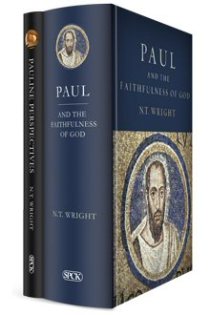I want to draw attention to a new book on Paul that will become a “must reference” (note: not a “must read”!) for anyone preaching or teaching on the apostle Paul or any of Paul’s writings.
The book is N.T. Wright’s 2-volume Paul and the Faithfulness of God (Fortress, 2013), and I say “must reference” instead of “must read” because almost nobody is actually going to read the full volumes’ 1,700 pages!
(I recall when Wright spoke at the British New Testament conference in Edinburgh, 2004, his doctoral supervisor, Prof. Morna Hooker of Cambridge, introduced him by saying that as a PhD student they couldn’t get Wright to write anything; now, they can’t get him to stop!)
Wright is arguably the greatest living New Testament scholar. And while this obviously doesn’t make his views on everything correct, his encyclopedic knowledge of the New Testament, Christian origins, and Second Temple Judaism warrants paying careful attention to anything he has to say.
Wright is the most famous proponent of what’s been called the “New Perspective” on Paul, a project in re-reading Paul’s writings through the eyes of 1st-century Judaism that ultimately challenges a number of cherished convictions we’ve inherited through Augustine and Luther. (See here for a quick summary, and follow the links for more information.)
The “New Perspective” actually isn’t all that new. Although its origins are often credited to E.P. Sanders’ 1977 landmark book, Paul and Palestinian Judaism, Sanders himself acknowledges that he’s really building on the work of Albert Schweitzer, particularly The Mysticism of Paul the Apostle (published in 1930 in German; 1931 in English translation).
Since Schweitzer, several scholars – including Jewish scholars – have criticized Luther’s reading of Paul. Their chief complaint: Luther’s presentation of “Judaism” with its accompanying notions of “legalism” and attempts to “earn salvation” through “good works” is completely alien to actual Judaism, whether Judaism today or in Paul’s own day.
Instead, Luther reads his own struggles against the medieval Catholic church into his readings of Paul, identifying the Judaism of Paul’s day with the Catholic legalists of Luther’s own situation.
From a “New Perspective,” Judaism was never a “legalistic” religion. Rather, it was a people who identified themselves by their covenant with God: What makes Israel special is not that they’ve “earned” God’s favour by perfect performance under the Law, but that they, as a people, have been chosen by God. “Good works” are the “identity markers” that show they belong to that covenant relationship, often summarized as circumcision, Sabbath-keeping, and food laws.
Paul’s agenda in pitting “faith” vs. “works” doesn’t have to do with whether we do “good deeds” (in 2 Cor 5.10 Paul makes pretty clear we’ll be judged for our deeds! Cf. Rom 2.6). Instead, Paul is battling notions of Jewish identity as it pertains to gentiles.
Paul combats the Jewish assumption that the only appropriate response to covenant relationship with God is to display the assigned “identity markers” (e.g., circumcision, Sabbath-keeping, food laws), and that this goes for gentiles, too.
Not so!, says Paul. Jesus has extended the boundary to include gentiles as “God’s people” without the accompanying Jewish identity markers. Faith in Jesus is now the only identity marker for Jew and gentile (Rom 2.11). Thus although Jewish Jesus-followers can (and probably should) continue to practise circumcision, Sabbath-keeping, and food laws as a distinct people within “God’s people”, they should not impose these practices on gentile Jesus-followers.
I’m in the “New Perspective” camp myself, though it’s important to note that the camp is far larger and more diverse than N.T. Wright’s particular take on things.
For an ongoing review of Wright’s latest book I point you to Larry Hurtado’s blog: here, here, here and here.

Thanks for this primer on ‘the New Perspective on Paul’ (NPP). You bring an important reminder to us all that the NPP is really not really that new, or original to Wright. Interestingly enough, I’ve only ever heard Wright preface the ‘NPP’ with the statement ‘the so called…”
Personally, I think it’s tragic that we have labeled the NPP as ‘new’. It’s only new in relation to Luther and the Reformers. It’s not ‘new’ to the Roman Catholic and Eastern Orthodox Church, who have closer views to that of Wright (and others of the NPP). As Taylor Marshall, a former Protestant, turned Catholic, put it:
“N.T. Wright is a good enough biblical theologian to realize that Paul didn’t teach personal salvation by way of an imputation of an alien righteousness. That’s why the Anglican bishop has received so much attention – he’s a Protestant writing like a Catholic.”
OTOH, when it comes to language related to “works,” “law,” “righteousness” or “justification,” NPP is not Catholic or Orthodox, either. In that sense it IS a “new” perspective, albeit older than 1977.
I totally agree that the NPP is not espousing a strict Catholic or EO position. I’m sorry if I appeared to make that connection. I just find the NPP to be ‘closer’ to those respective traditions than the old perspective of Paul. This seems particularly evident to me in the discussion around ‘works’. A Lutheran reading appears to me as a polarization, whereas the other positions at least appear to be in the same room discussing the issues… but I could be wrong.
“How new?” is precisely the question.
I heard Tom Wright once joke that the NPP is at least as old as Galatians! 😉 Authors like Michael Bird have seen strong similarities between the NPP and the views of the early Church Fathers, especially regarding the “works of the law” (ergōn nomou). (see link)
http://www.thesacredpage.com/2013/09/the-church-fathers-on-works-of-law.html